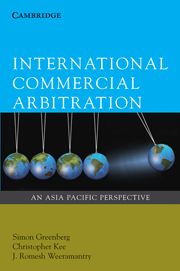Book contents
- Frontmatter
- Contents
- Foreword
- Preface
- Table of Cases
- Table of Statutes
- 1 Introduction to international arbitration and its place in the Asia-Pacific
- 2 Law governing the arbitration and role of the seat
- 3 Applicable substantive law
- 4 Arbitration agreement
- 5 Arbitral jurisdiction
- 6 The arbitral tribunal
- 7 Procedure and evidence
- 8 The award
- 9 The award
- 10 Investment treaty arbitration
- Appendix 1 Asia-Pacific arbitral institutions at a glance
- Appendix 2 Selected arbitral institutions
- Appendix 3 List of UNCITRAL Model Law countries
- Appendix 4 List of parties to the New York Convention 1958
- Appendix 5 Selected list of Asia-Pacific arbitration legislation and instruments
- Glossary
- Index
4 - Arbitration agreement
Published online by Cambridge University Press: 05 June 2012
- Frontmatter
- Contents
- Foreword
- Preface
- Table of Cases
- Table of Statutes
- 1 Introduction to international arbitration and its place in the Asia-Pacific
- 2 Law governing the arbitration and role of the seat
- 3 Applicable substantive law
- 4 Arbitration agreement
- 5 Arbitral jurisdiction
- 6 The arbitral tribunal
- 7 Procedure and evidence
- 8 The award
- 9 The award
- 10 Investment treaty arbitration
- Appendix 1 Asia-Pacific arbitral institutions at a glance
- Appendix 2 Selected arbitral institutions
- Appendix 3 List of UNCITRAL Model Law countries
- Appendix 4 List of parties to the New York Convention 1958
- Appendix 5 Selected list of Asia-Pacific arbitration legislation and instruments
- Glossary
- Index
Summary
Introduction
Arbitration agreements embody the consent of the parties to submit their disputes to arbitration. In essence they oust the jurisdiction of domestic courts to decide certain disputes and instead empower an arbitral tribunal to resolve those disputes. The extent and scope of these two functions are dependent on the words of the arbitration agreement and the laws governing both that agreement and the arbitration proceedings. The arbitration agreement is especially important in determining the jurisdiction and powers of an arbitral tribunal.
Some suggest that arbitration agreements are so powerful that they are supranational and beyond domestic laws. The French courts have on occasion adopted this position. They have held that an arbitration agreement is independent of all national laws and forms a supranational source of authority for arbitral jurisdiction.
This chapter begins with a general discussion of the form and formal requirements of arbitration agreements in Section 2. Section 3 explains the concept of the doctrine of separability, which concerns the separation of an arbitration clause from the contract in which it is contained. Section 4 moves on to consider the issues of identity, non-signatories and capacity, following which Section 5 addresses the requirement of a defined legal relationship. The focus of the chapter then turns to the issues of consolidation, joinder and intervention of third parties in Section 6. Section 7 considers the enforcement of arbitration agreements. Section 8 covers the important topic of arbitrability and distinguishes between subjective arbitrability and objective arbitrability.
- Type
- Chapter
- Information
- International Commercial ArbitrationAn Asia-Pacific Perspective, pp. 144 - 201Publisher: Cambridge University PressPrint publication year: 2010

